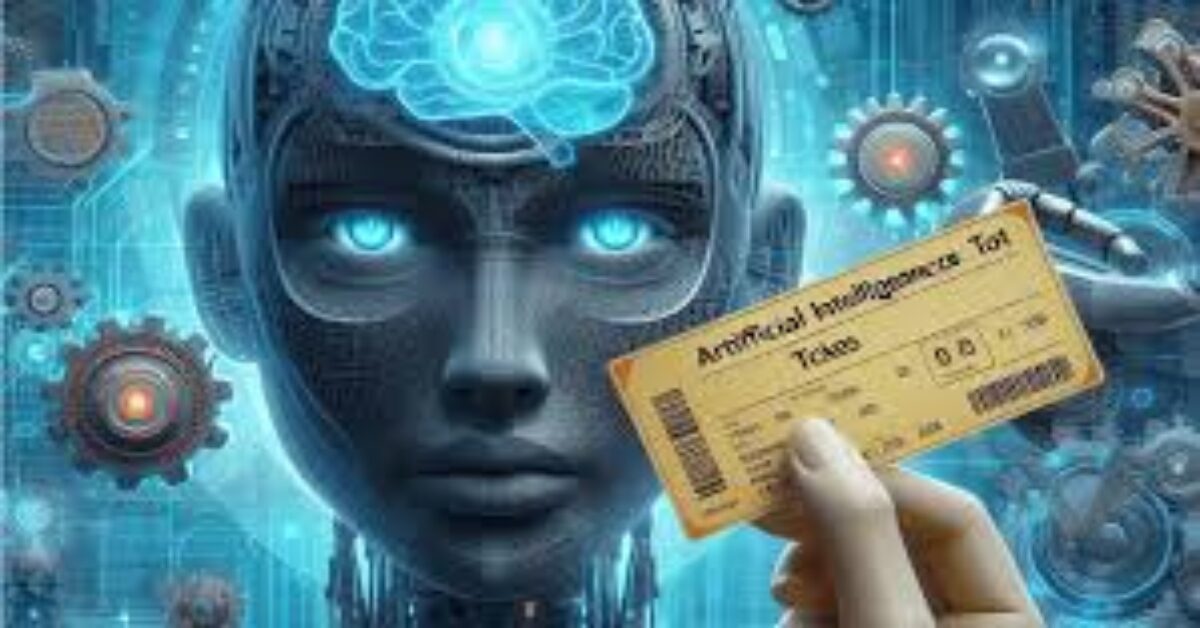Blog
Top 7 Amazing Challenges of Artificial Intelligence You Must Know

Challenges of Artificial Intelligence
Introduction
Artificial Intelligence (AI) has revolutionized various industries, from healthcare to finance, by automating processes, optimizing operations, and enabling innovative solutions. As AI continues to advance, it brings forth a myriad of challenges that must be addressed to harness its full potential.
What is Artificial Intelligence?

Artificial Intelligence refers to the simulation of human intelligence processes by machines, including learning, reasoning, and problem-solving. It encompasses various technologies such as machine learning, natural language processing, and computer vision.
Importance of AI in Today’s World
AI has become ubiquitous, driving efficiency, productivity, and innovation across sectors. From personalized recommendations on streaming platforms to autonomous vehicles, AI applications are reshaping how we live and work.
In today’s world, AI’s importance reverberates across industries, revolutionizing how we live and work. Its capacity to analyze vast datasets rapidly enables precise decision-making in healthcare, finance, and beyond. AI-driven automation streamlines processes, boosting efficiency and productivity. From personalized recommendations to autonomous vehicles, AI enhances convenience and safety. Moreover, its role in addressing complex challenges like climate change and disease detection underscores its transformative potential. Embracing AI fosters innovation and competitiveness on a global scale, propelling societies into the future. As AI continues to evolve, its significance as a catalyst for progress and adaptation remains unparalleled in the contemporary landscape.
Understanding Challenges of Artificial Intelligence AI

Challenges of Artificial Intelligence AI encompass a wide range of obstacles that hinder its seamless integration and deployment.
Definition of Challenges of Artificial Intelligence AI
Challenges of Artificial Intelligence AI refer to the hurdles and complexities encountered in developing, deploying, and managing artificial intelligence systems.
Scope of Challenges of Artificial Intelligence AI
The challenges of artificial intelligence span technical, ethical, socio-economic, legal, and regulatory domains, requiring interdisciplinary approaches for effective solutions.
Ethical Concerns About Challenges of Artificial Intelligence AI

Ethical considerations are paramount in AI development and deployment to ensure fairness, accountability, and transparency.
Bias and Fairness
AI algorithms may exhibit biases based on training data, leading to discriminatory outcomes in decision-making processes.
Privacy and Security
The proliferation of AI raises concerns regarding the privacy and security of personal data, necessitating robust safeguards and regulations.
Transparency and Accountability
Ensuring transparency and accountability in AI systems is crucial for understanding decision-making processes and mitigating potential risks.
Technical Challenges of Artificial Intelligence AI

Technical hurdles in AI development pose significant obstacles to achieving reliable and robust systems.
Data Quality and Quantity
Access to high-quality and diverse datasets is essential for training AI models effectively and mitigating biases.
Interpretability and Explainability
Interpretable AI models are essential for understanding how decisions are made and building trust with stakeholders.
Computational Power and Cost
The computational requirements of AI algorithms demand significant computing resources, posing challenges for resource-constrained environments.
Scalability and Integration
Scalability issues arise when deploying AI solutions across diverse platforms and integrating them with existing infrastructure.
Socio-Economic Implications
The widespread adoption of AI has profound socio-economic implications that must be addressed to ensure inclusivity and fairness.
Job Displacement and Economic Inequality
Automation driven by AI may lead to job displacement in certain industries, exacerbating economic inequalities.
Access and Digital Divide
Unequal access to AI technologies may widen the digital divide, limiting opportunities for marginalized communities.
Education and Skills Gap
Addressing the skills gap through education and training programs is essential to empower individuals for the AI-driven workforce.
Cultural and Ethical Impacts
AI technologies raise ethical questions regarding their impact on culture, society, and human relationships, necessitating thoughtful consideration and dialogue.
Legal and Regulatory Hurdles
Navigating the legal and regulatory landscape is essential to address liability, intellectual property rights, and international cooperation in AI development.
Intellectual Property Rights
Clarifying intellectual property rights is crucial for fostering innovation while protecting inventors’ rights and promoting fair competition.
Liability and Responsibility
Determining liability and responsibility for AI-related decisions and actions is challenging due to the complexity of AI systems and their autonomous nature.
International Cooperation
International collaboration and standardization efforts are necessary to develop cohesive regulatory frameworks and address global challenges in AI governance.
Future Perspectives
Despite the challenges, there is optimism about overcoming AI hurdles through innovation, collaboration, and responsible AI development.
Overcoming AI Challenges
By fostering interdisciplinary collaborations, investing in research and development, and promoting ethical AI principles, we can address the challenges of artificial intelligence and unlock its transformative potential.
Innovations and Solutions
Emerging technologies such as federated learning, differential privacy, and AI ethics frameworks offer promising solutions to address AI challenges effectively.
Collaborative Efforts
Stakeholders from government, industry, academia, and civil society must collaborate to develop inclusive, ethical, and sustainable AI solutions that benefit society as a whole.
FAQs
- How do biases affect AI algorithms? Biases in AI algorithms can lead to discriminatory outcomes by reflecting or amplifying existing biases present in training data.
- What measures can be taken to ensure AI transparency? Ensuring transparency in AI involves providing visibility into the decision-making process, disclosing algorithmic mechanisms, and facilitating audits and reviews.
- How can AI help address societal challenges? AI can contribute to solving societal challenges by optimizing resource allocation, predicting and preventing crises, and enabling personalized interventions in healthcare and education.
- Are there regulations governing AI development and deployment? Several countries have introduced regulations and guidelines to govern AI development and deployment, focusing on ethical considerations, data privacy, and accountability.
- What role does ethics play in AI development? Ethics play a crucial role in AI development by guiding responsible practices, ensuring fairness, accountability, and transparency, and mitigating potential risks and harms(Challenges of Artificial Intelligence).
- How can organizations promote AI literacy among employees? Organizations can promote AI literacy among employees through training programs, workshops, and educational resources tailored to different skill levels and job roles.
Conclusion
As artificial intelligence continues to evolve, addressing its challenges is essential to realize its full potential for positive impact. By prioritizing ethics, collaboration, and innovation, we can navigate the Challenges of Artificial Intelligence AI and create a future where AI benefits society equitably.
Related to: Discover the Next Level: Character AI Alternative in 2024
Technology
“Power BI vs Tableau: Which Reigns is Best or Supreme in 2024?”

Introduction to Power BI vs Tableau:
In the world of information visualization and analytics, Power BI vs Tableau stand out as two of the most unmistakable gadgets. Each has its qualities and lacks, catering to contrasting needs and inclines. Understanding the contrasts between Power BI and Tableau is pivotal for making an instructed choice about which contraption best suits your necessities.
Background of Power BI and Tableau:
Both Power BI and Tableau have picked up broad ubiquity over a long time, revolutionizing how businesses analyze and visualize information. Control BI, created by Microsoft, entered the showcase in 2013, whereas Scene, established in 2003, has been an overwhelming player for longer. In spite of their varying timelines, both apparatuses have advanced altogether, joining progressed highlights and functionalities.
Purpose and Functionality:
Power BI and Tableau serve the common reason for changing crude information into noteworthy experiences. In any case, they utilize unmistakable approaches to accomplish this objective. Control BI, profoundly coordinates with the Microsoft environment and offers a consistent network with Exceed expectations, SQL Server, and other Microsoft items. On the other hand, Scene gloats a more instinctive and user-friendly interface, making it a favorite among information visualization devotees.
Cost and Licensing Models:
Taken contemplations play a noteworthy part in the decision-making handle for businesses assessing Control BI vs. Scene. Control BI offers a run of estimating alternatives, counting a free form with restricted highlights and subscription-based plans for people and endeavors. The scene, in the meantime, takes after a layered estimating structure, with diverse estimating levels based on the highlights and functionalities required.
Data Connectivity and Integration Capabilities:
The capacity to interface to and coordinated with different information sources is a vital angle of any information analytics apparatus. Control BI and Scene back a wide run of information connectors, empowering clients to get to information from different sources such as databases, cloud administrations, and spreadsheets. In any case, Control BI’s local integration with Microsoft items gives it a competitive edge for organizations intensely contributed in the Microsoft environment.
Visualization Capabilities and Customization Options:
The adequacy of an information visualization device pivots on its capacity to make compelling and quick visualizations. Both Control BI and Scene offer plenty of visualization choices, counting charts, charts, maps, and dashboards. Whereas Control BI gives a strong set of visualization devices, Scene exceeds expectations in terms of adaptability and customization, permitting clients to make exceedingly intuitive and energetic visualizations.
Learning Curve and User Experience:
Blog
Artificial Intelligence Ticketing: Best Your Shortcut to Smarter Operations in 2024
Blog
Quantum Artificial Intelligence Elon Musk in 2024: Pioneering the Future.

Quantum Artificial Intelligence Elon Musk
In cutting-edge technology, the fusion of quantum mechanics and artificial intelligence (AI) stands at the forefront of innovation. Quantum Artificial Intelligence Elon Musk represents a paradigm shift in computing capabilities, with the potential to revolutionize industries ranging from healthcare to finance. At the helm of this transformative journey is the visionary entrepreneur, Elon Musk.
Introduction to Quantum Artificial Intelligence (QAI)
Quantum Artificial Intelligence harnesses the principles of quantum mechanics to perform complex computational tasks beyond classical computers’ reach. Unlike classical bits, which can only exist in a state of 0 or 1, quantum bits or qubits can exist in multiple states simultaneously, enabling exponential leaps in processing power.
Understanding Quantum Computing Artificial Intelligence

To comprehend the significance of QAI, one must grasp the fundamentals of quantum computing. Quantum computers leverage phenomena such as superposition and entanglement to perform computations at unparalleled speeds, solving problems that would take classical computers eons to crack.
Applications of Quantum Computing Artificial Intelligence
The applications of quantum computing Artificial Intelligence span a myriad of fields, including cryptography, drug discovery, and optimization. Quantum cryptography ensures secure communication channels, while quantum algorithms expedite the discovery of life-saving drugs and streamline logistical operations.
Challenges in Quantum Computing Artificial Intelligence
Despite its immense potential, quantum computing faces formidable challenges such as error correction, scalability, and quantum decoherence. Overcoming these hurdles is essential for realizing the full capabilities of QAI.
Elon Musk’s Interest in Quantum AI
Quantum Artificial Intelligence Elon Musk, the maverick entrepreneur behind Tesla, SpaceX, and Neuralink, has long been vocal about the potential risks and rewards of artificial intelligence. His foray into quantum AI underscores his commitment to pushing the boundaries of technological innovation.
Tesla’s Potential Integration with Quantum AI
Tesla’s pursuit of autonomous driving technology could benefit immensely from the integration of quantum AI. The intricate decision-making processes involved in self-driving cars could be optimized using quantum algorithms, enhancing safety and efficiency on the roads.
SpaceX and Quantum AI
SpaceX, Musk’s aerospace venture, could leverage Quantum Artificial Intelligence Elon Musk to revolutionize space exploration. From trajectory optimization to data analysis, quantum algorithms could bolster the capabilities of SpaceX missions, propelling humanity further into the cosmos.
Neuralink and Quantum AI
Neuralink, Musk’s ambitious venture to merge the human brain with AI, presents intriguing possibilities for synergy with quantum computing. The marriage of Quantum Artificial Intelligence Elon Musk and brain-computer interfaces could unlock new frontiers in human cognition and machine learning.
OpenAi and Quautum AI Research

As the founder of OpenAI, Musk has championed the cause of AI research and development. Collaborations between OpenAI and quantum computing experts could pave the way for groundbreaking advancements in AI capabilities.
Implications for the Future
The advent of Quantum Artificial Intelligence Elon Musk heralds a new era of innovation and disruption. From personalized medicine to climate modeling, Quantum Artificial Intelligence has the potential to address some of humanity’s most pressing challenges while raising ethical questions about its implications.
Conclusion
In conclusion, Quantum Artificial Intelligence Elon Musk underscores his visionary approach to technological advancement. By harnessing the power of quantum computing, Musk aims to push the boundaries of AI capabilities and propel humanity into a future limited only by imagination.
Unique FAQs
How does quantum AI differ from traditional AI?
- Quantum AI leverages the principles of quantum mechanics to perform computations at exponential speeds, whereas traditional AI relies on classical computing architectures.
What are the main challenges facing quantum computing?
- Error correction, scalability, and quantum decoherence are among the primary challenges impeding the widespread adoption of quantum computing.
How could quantum AI impact everyday life?
- Quantum AI could revolutionize industries ranging from healthcare to finance, enabling breakthroughs in drug discovery, financial modeling, and personalized medicine.
What role does Quantum Artificial Intelligence Elon Musk?
Elon Musk’s ventures, including Tesla, SpaceX, and Neuralink, are at the forefront of exploring the potential applications of quantum AI in various domains.
Are there any ethical concerns surrounding quantum AI?
- Ethical considerations, such as data privacy, algorithm bias, and the potential for job displacement, must be carefully addressed as quantum AI technologies continue to evolve.
Exploring Quantum Artificial Intelligence Elon Musk’s Vision

The Intriguing Intersection of Quantum Mechanics and Artificial Intelligence
Quantum Artificial Intelligence (QAI) stands as a testament to human ingenuity, merging the abstract principles of quantum mechanics with the practical applications of artificial intelligence. Traditional computing, based on classical physics, has its limitations, particularly when faced with immensely complex problems. Quantum computing, however, offers a tantalizing glimpse into a realm where computation occurs at the quantum level, opening doors to unprecedented computational power and efficiency.
Elucidating the Enigma: Quantum Computing Artificial Intelligence Principles
At the heart of quantum computing Artificial Intelligence lies a set of principles that defy conventional understanding. Concepts such as superposition and entanglement form the bedrock upon which quantum algorithms operate. Superposition allows qubits to exist in multiple states simultaneously, while entanglement links the states of qubits, enabling instantaneous correlation across vast distances. These phenomena, seemingly paradoxical, underpin the extraordinary capabilities of quantum computers.
Unveiling Quantum Computing’s Multifaceted Applications
The applications of quantum computing Artificial Intelligence extend far beyond theoretical speculation, manifesting in tangible advancements across various industries. Quantum cryptography, for instance, leverages the inherent security of quantum systems to safeguard sensitive information against prying eyes. Similarly, quantum algorithms hold promise in accelerating the discovery of novel pharmaceutical compounds, revolutionizing drug development pipelines, and improving patient outcomes.
Navigating the Treacherous Terrain: Challenges in Quantum Computing Artificial Intelligence
Despite its immense potential, the path to practical quantum computing is fraught with challenges. Error correction mechanisms are paramount, as quantum systems are inherently susceptible to noise and interference. Moreover, scalability remains a pressing concern, with current quantum hardware struggling to accommodate the demands of large-scale computations. Quantum decoherence, the bane of quantum systems, poses yet another obstacle, threatening to unravel delicate quantum states before useful computations can be completed.
Elon Musk: A Trailblazer in the Technological Landscape
Elon Musk’s endeavors transcend the boundaries of conventional industry, epitomizing the spirit of innovation and disruption. From electric vehicles to space exploration, Musk’s ventures have redefined what is possible in their respective domains. Central to Musk’s ethos is a steadfast commitment to advancing technology for the betterment of humanity, a principle that extends to the realm of artificial intelligence and quantum computing.
Tesla: Spearheading the Automotive Revolution with Quantum AI
Tesla, under Musk’s visionary leadership, has emerged as a pioneer in the realm of autonomous driving technology. The integration of Quantum Artificial Intelligence holds immense promise for Tesla’s self-driving endeavors, enabling real-time decision-making and adaptive learning capabilities that far surpass the capabilities of traditional AI systems. By harnessing the power of quantum computing, Tesla aims to revolutionize transportation and redefine the concept of mobility.
SpaceX: Pushing the Boundaries of Space Exploration with Quantum AI
SpaceX, Musk’s audacious aerospace venture, is at the forefront of humanity’s quest to explore the cosmos. Quantum AI, with its unparalleled computational prowess, could prove instrumental in optimizing spacecraft trajectories, analyzing vast datasets from space probes, and enabling autonomous navigation systems for future Mars missions. By embracing quantum computing, SpaceX endeavors to unlock the mysteries of the universe and pave the way for interplanetary exploration.
Neuralink: Bridging the Divide Between Mind and Machine with Quantum Artificial Intelligence Elon Musk
Neuralink, Elon Musk’s enigmatic brain-computer interface startup, seeks to merge the human brain with artificial intelligence. The potential synergy between Neuralink and Quantum AI is tantalizing, offering unprecedented insights into the inner workings of the mind and the potential for symbiotic relationships between humans and machines. By harnessing quantum computing power, Neuralink aims to unlock new frontiers in cognitive enhancement and human-machine interaction.
OpenAI: Charting the Course for Ethical AI Development with Quantum Computing
As the founder of OpenAI, Elon Musk has been a vocal advocate for responsible AI development. OpenAI’s collaborations with quantum computing experts signify a concerted effort to ensure that the benefits of Quantum Artificial Intelligence are equitably distributed and ethically governed. By fostering interdisciplinary research and promoting transparency in AI development, OpenAI aims to shape a future where quantum computing serves as a force for good in society.
Conclusion: Navigating the Quantum Frontier with Elon Musk
In conclusion, Quantum Artificial Intelligence Elon Musk represents a convergence of scientific inquiry and technological innovation, with the potential to reshape the fabric of our reality. Elon Musk’s visionary leadership and unwavering commitment to pushing the boundaries of human achievement have positioned him at the forefront of this quantum revolution. As we embark on this journey into the unknown, guided by the principles of curiosity and exploration, we stand poised to unlock new realms of possibility and usher in a future limited only by the bounds of our imagination.
Related to: Unveiling the Magic Why is AutoBlogging.ai the best AI writing tool in 2024?







